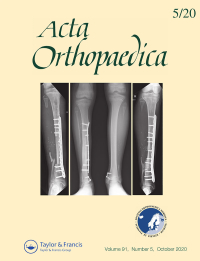Mobile-bearing medial unicompartmental knee arthroplasty restores limb alignment comparable to that of the unaffected contralateral limb
DOI:
https://doi.org/10.1080/17453674.2016.1253327Abstract
Background and purpose — Medial unicompartmental knee arthroplasty (UKA) is undertaken in patients with a passively correctable varus deformity. We investigated whether restoration of natural soft tissue tension would result in a lower limb alignment similar to that of the contralateral unaffected lower limb after mobile-bearing medial UKA. Patients and methods — In this retrospective study, hip-knee-ankle (HKA) angle, position of the weight-bearing axis (WBA), and knee joint line obliquity (KJLO) after mobile-bearing medial UKA was compared with that of the unaffected (clinically and radiologically) contralateral lower limb in 123 patients. Results — Postoperatively, HKA angle was restored to within ±3° of the contralateral lower limb in 87% of the patients and the WBA passed within ±1 Kennedy and White’s tibial zone of the unaffected contralateral lower limb in 95% of the patients. The mean KJLO in the operated limbs was not significantly different from that in the unaffected lower limbs (p = 0.07) and the KJLO in the operated limb was restored to within ±3° of that in the contralateral lower limb in 96% of the patients. Interpretation — Lower limb alignment and knee joint line obliquity after mobile-bearing medial UKA were comparable to that of the unaffected contralateral limb in most patients. Comparison with the contralateral unaffected lower limb is a reliable method for evaluation and validation of limb mechanical alignment after mobile-bearing medial UKA.Downloads
Download data is not yet available.
Downloads
Published
2017-01-02
How to Cite
Mullaji, A. B., Shah, S., & Shetty, G. M. (2017). Mobile-bearing medial unicompartmental knee arthroplasty restores limb alignment comparable to that of the unaffected contralateral limb. Acta Orthopaedica, 88(1), 70–74. https://doi.org/10.1080/17453674.2016.1253327
Issue
Section
Articles
License

This work is licensed under a Creative Commons Attribution-NonCommercial 3.0 Unported License.
Acta Orthopaedica (Scandinavica) content is available freely online as from volume 1, 1930. The journal owner owns the copyright for all material published until volume 80, 2009. As of June 2009, the journal has however been published fully Open Access, meaning the authors retain copyright to their work. As of June 2009, articles have been published under CC-BY-NC or CC-BY licenses, unless otherwise specified.







